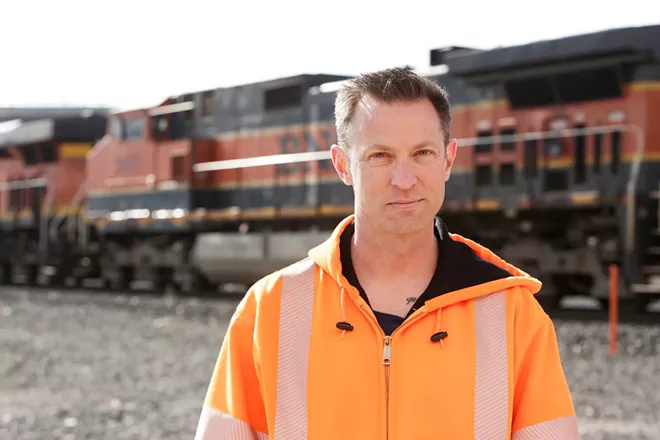
Like other corporations, the Burlington Northern Santa Fe Railway sent out a flier to their employees encouraging them to get plenty of rest to prepare for the Daylight Saving Time change in March. But Shawn Blackburn, a 49-year-old BNSF engineer in Spokane, thought that hilarious. The very idea of it, of just a one-hour time difference being the thing that could disrupt his sleep schedule. Thanks to his ever-changing work schedule, as the time shift hit, he'd gone 27 hours without sleep.
"And at a good portion of the end of it, at the most sleepiest time, when you're literally wuhwuh-wuhwah —," Blackburn's head lolls back and forth as he pantomimes the heavy-eyed struggle to stay awake, "I was operating a f—-ing train."
You don't get to have a regular sleep schedule in this job. It's not just that the schedule changes, it's how fast it changes.
As we sit at his kitchen table for an interview on a Sunday, he watches his work schedule on the official company iPad in real-time. When we'd started talking, he was scheduled to work next at 4 pm Monday. But as demands and the number of available workers change, so did the schedule.
"Now it says I moved up to 11:30 tomorrow morning," Blackburn says. "This is what I end up doing — getting attached to this f—-ing app."
In the span of a few hours, a scheduled day shift can suddenly turn to a graveyard shift.
Don Sluder, a conductor who sometimes works in the same locomotive cab as Blackburn, paints a scenario: You get to bed at 8:30 pm, expecting to wake up in the morning for an 8 am shift. Thirty minutes later, however, you get a phone call saying you've got to work tonight at 11.
"You've just been up all day, doing whatever, you've got half-an-hour of sleep, and they're now asking you to take a 16,000-ton oil train to Pasco, at 11 at night," Sluder says. "If I'm coming around a curve, and I miss that there's a rockslide, that train goes in the river."
Back in 2017, an average of 200 oil train cars were rumbling through Spokane a day.
"BNSF wants to ensure that everyone is rested and prepared to work safely," the company explains to employees in a document explaining an attendance policy that explicitly allows employees to take off 24 hours to rest for "fatigue."
But there's a catch: Under a new policy put in place in February, they get penalized for doing so.
Depending on the type of employee and the day, taking a day off to catch up on sleep can cost them anywhere from two to 13 "points" out of a maximum of 30 points. It's the same limited pool workers use for sick leave, doctor's appointments, taking care of family members or visiting a mechanic. Run out of points, and you're subject to discipline — and your point total is reset to 15. Run out three times, and your job is on the chopping block.
Local railroad workers like Blackburn see a mounting disaster — not just for the potential of train derailments and oil train explosions — but for the long-term health of the country's supply lines, and they worry railroad unions have atrophied to the point that they've been too weak to stop it.
ALL THE LIVE-LONG DAY
On multiple private Facebook pages, Sluder says, railroad workers have been scrambling to untangle the complicated rules of the new "Hi Viz" attendance system.
You start with 30 points. Most weekdays taken off cost just two points. Fridays and Saturdays are four. Sundays are three points. But Easter Sunday? That's a "high-impact day," so it's seven points. Where many workers in other professions automatically get Christmas or New Year's off, at BNSF they're penalized more for taking time off that day.
Meanwhile, earning those points back is excruciatingly slow. Mark yourself available to work for 14 days straight — no breaks — and you get "good attendance" credit worth four points, enough for a single Saturday.
In court documents, BNSF claimed the policy was necessary. With railroad staffing levels falling below 70 percent on weekends, supply lines were being choked. And, at least initially, it worked: The month BNSF implemented the new policy, the number of unavailable employees fell by nearly a third.
In response to repeated Inlander requests for an interview, BNSF provided the same canned statement it's provided to other media outlets, arguing that, in fact, Hi Viz provides "ample time for obligations outside of work, including planned vacations, personal leave days and unplanned absences..."
But employees say even some scheduled vacation and personal days get yanked at the last minute if their staffing levels are low enough. And try to extend a vacation by taking a sick day off before coming back to work? That's an extra two-point "conjunction penalty."
Under the previous system, Blackburn's sleep schedule was already a mess, but at least he'd been guaranteed five weekdays and two weekend days off a month. That time off was how he survived in the industry.
"You burn out, but 'now I can take a couple days off to relax,'" Blackburn says. "You can mow the grass — you know what I mean?"
But that saving grace is effectively gone: Under Hi Viz, even if he worked four weeks straight, he'd still only have earned enough points to take one Friday and one Saturday off.
Blackburn doesn't get weekends off automatically. True, federal law says that if he's at the controls of a train at least six days straight, he gets two days off. But that rarely happens.
Last week, Blackburn had worked four days in a row. But then BNSF stuck Blackburn on the train as a passenger and sent him to the Tri-Cities — a practice called deadheading — to help a short-staffed crew in Pasco. Since Blackburn wasn't technically working on the trip, it reset his streak.
Sluder, the conductor, is on a different kind of schedule. He's assigned to a specific route that offers him a 48-hour break for every four days he works. But as a result, Hi Viz charges him a premium — seven to 10 points — if he wants, say, to take off a fatigue day.
And because his schedule remains unpredictable, the days of being able to assure his son that he'll be able to chaperone his field trip or attend his Junior ROTC events are over. Sluder has avoided using any of Hi Viz points so far. If he did, he worries, he wouldn't have enough cushion if something happens.
"Let's say the Verizon network crashes, and the railroad tries to call me," Sluder says. If they can't get through, "that's a 15-point penalty right there."
He knows others who are down to one point and have to scramble if their kid gets sick. He says the BNSF has never fully clarified their COVID policy, and he knows coworkers who came to work with COVID rather than risk losing points. Another BNSF employee, going through a brutal divorce, tells the Inlander about a court hearing that, if missed, would mean he wouldn't be able to see his kids for a year. But without enough Hi Viz points left, he had a brutal choice: his kids or his job?
Yet Blackburn knows there's more than one way to lose your family.
"I have a lot of anxiety over the family unit breaking up with me not around as much," Blackburn says. "I have a fear of losing connection with a good chunk of my kids' life."
A WEAKENED UNION
After 44 years of representing railroad workers, Bill Jungbauer, a Minnesota attorney with a voice like The Princess Bride's Wallace Shawn, says he's heartbroken watching what's happening to the industry.
"They're breaking up families," Jungbauer says. "People that love their job can't do it. Their customers are suffering. And the railroads are making billions of dollars."
In a letter to investors last year, billionaire Warren Buffett put his ownership of the BNSF railroad on par with his investment in Apple.
Buffett bragged that, despite a 7 percent decline in the volume of goods carried in 2020, the railroad's profit margin actually increased by 2.9 percentage points.
"Your railroad is in good hands," Buffet wrote.
But the railroad unions?
"They are so weak right now," Jungbauer says. "The courts won't support 'em. The legislatures won't support 'em."
Jungbauer says that the national railroad unions have made plenty of missteps of their own over the years. There were bribery and corruption scandals. Infighting between the union for engineers and the union for the conductors allowed the railroad to "play them off against each other."
Employee frustration with their unions, Sluder suspects, was why the unions felt the need to try to hold a strike over Hi Viz.
"The membership has said, 'Enough is enough,'" Sluder says. "'If you don't start showing us that you're doing something, why are we paying union dues?'"
It was another tactical error, Jungbauer says. The Railroad Labor Act, first passed almost a century ago, bars a strike for all but the most major conflicts. In their lawsuit successfully asking a Texas court to block the January strike attempt, BNSF pointed to all the other unilateral changes they made over the years to employee attendance policies that went unchallenged by the unions, while stressing the economic damage that a strike would do to the economy's fragile supply lines.
But Jungbauer says Hi Viz is already doing long-term economic damage by sparking an exodus of experienced employees from BNSF.
"The joy of being a railroader is gone," he says. One Facebook group, "Rail-Workers Accountability Slate 2022," has tracked the hundreds of BNSF employees who've quit since Hi Viz was implemented.
Jungbauer believes the railroads are intentionally creating a labor shortage: Get down to low enough staffing levels, he says, and the railroad could successfully petition regulators to let them run trains with only one employee. And that, engineers and conductors say, would be a disaster.
Banned from even listening to music while operating a train, these railroaders say being able to talk to their coworker is the one thing keeping them sane — and awake.
"You can't depend on the technology to save you," Sluder says. "I can't tell you how many times that computer system has blanked out on us."
For now, Sluder estimates that about 40 railroad workers in the Spokane area alone have quit since Hi Viz was implemented.
BNSF conductor Michael Girven says he's known railroad workers quit to become tree-trimmers, get their college degree or take electrician apprenticeship classes. One longtime engineer, he says, left his railroad job where he'd eventually make up to $120,000 a year to be a much less well-paid security guard at a high school in Spokane Valley.
"He said, 'At least I'll see my kid grow up,'" Girven says.
Blackburn says his family wants him to make the same choice.
"They want me to quit," Blackburn says. "But they also recognize I'm going to be 50 years old this year."
The thought of trying to start again, to retrain in a whole new career at his age — that's terrifying.
"After 16 years, I've got Stockholm Syndrome, right?" says Blackburn. ♦



























